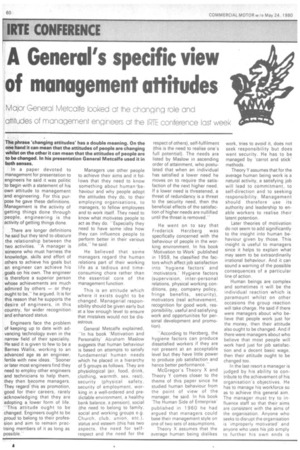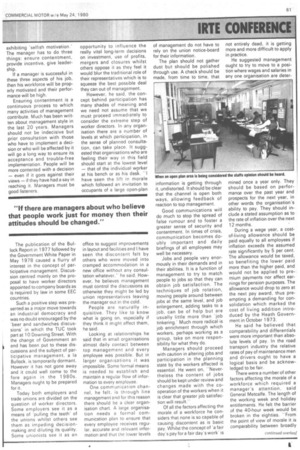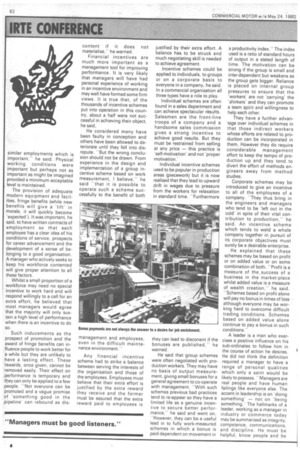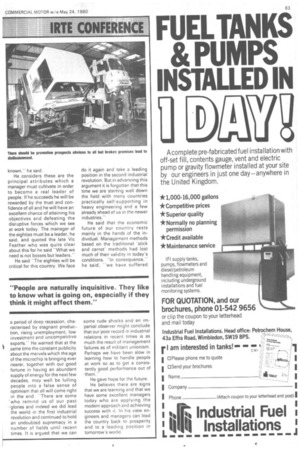• A General's specific view of management attitudes
Page 62

Page 63

Page 64

Page 65

If you've noticed an error in this article please click here to report it so we can fix it.
'Major General Metcalfe looked at e changing roe anc 'attitudes of management engineers at ne RTE conference last week
Thephrase 'changing attitudes' has a double meaning. On the onehand it can mean that the attitudes of people are changing • whilst on the other it can mean that the attitudes of people are to be changed. In his presentation General Metcalfe used it in both senses.
In a paper devoted to management for presentation to engineers he said it was politic to begin with a statement of his own attitude to management and engineering. For this purpose he gave these definitions. Management is the activity of getting things done through people, engineering is the activity of getting things done.
There are longer definitions • he said but they tend to obscure the relationship between the two activities. "A manager is . soneone who must harness the knowledge, skills and effort of others to achieve his goals but an engineer can achieve his . goals on his own. The engineer is therefore a superior person whose achievements are much admired by others — or they ought to be," he argued. It is for this reason that he supports the desire of engineers, in this country, for wider recognition. and enhanced status.
Engineers face the problem of keeping up to date with advancing technology even in the narrow field of their speciality. He said it is given to few to be a Barnes Wallis, working to an advanced age as an engineer, fertile with new ideas. "Sooner or later most engineers find they need to employ other engineers and technicians to help them, they then become managers. They regard this as promotion, good for their careers, rarely acknowledging that they are adopting a. lower form of life. "This attitude ought to be changed. Engineers ought to be proud to belong to their profession and aim to remain practising members of it as long as possible. Managers use other people to achieve their aims and it follows that they need to know something about human'behaviour and why people adopt the attitudes they do, to their employing organisations, to managers, to fellow employees and to work itself. They need to know what motivates people to act as they do. -Especially they need to have some idea how they can influence people to perform better in their various jobs," he said.
He believed that some managers regard the human relations part of their working life as a tedious and timeconsuming chore rather than the essential core of the management function.
This is an attitude which where it exists ought to be changed. Managerial responsibility should be given early but at a low enough level to ensure that mistakes would not be disastrous.
General Metcalfe explained, ''In his book 'Motivation and Personality' Abraham Maslow suggests that human behaviour is based on attempts to satisfy fundamental human needs which he placed in a hierarchy of 5 groups as follows. They are physiological (air, food, drink, clothing, warmth, sex, rest), security (physical safety, security of employment, working in a well-ordered and predictable environment, a healthy bank balance, a pension), social (the need to belong to family, social and working groups e.g. Church, club, union, etc.), status and esteem (this has two aspects, the need for selfrespect and the need for the
respect of others), self-fulfilment (this is the need to realise one's full potential), The needs are listed by Maslow in ascending order of attainment, who postulated that when an individual has satisfied a lower need he moves on to require the satisfaction of the next higher need. If a lower need is threatened, a threat of redundancy is a threat to the security need, then the beneficial effects of the satisfaction of higher needs are nullified until the threat is removed,
He went on to say that Frederick Herzberg was specifically concerned with the behaviour of people in the working environment. In his book 'Motivation to Work' published in 1959, he classified the factors which affect job satisfaction into 'hygiene factors' and 'motivators.' Hygiene factors (supervision, inter-personal relations, physical working conditions, pay, company policy, fringe benefits, security), motivators (real achievement, recognition for good work, responsibility, useful and satisfying work and opportunities for personal development and promotion).
"According to Herzberg, the hygiene factors can produce dissatisfied workers if they are not present at an acceptable level but they have little power to produce job satisfaction and hence better performance.
McGregor's Theory X and Theory Y comes closer to the theme of this paper since he studied human behaviour from the point of view of the manager, he said. In his book 'The Human Side of Enterprise' published in 1960 he had argued that managers could base their management style on one of two sets of assumptions.
Theory X assumes that the average human being dislikes work, tries to avoid it, does not seek responsibility but does want security. He has to be managed by 'carrot and stick' methods.
Theory V assumes that for the average human being work is a natural activity, a satisfying job will lead to commitment, to self-direction and to seeking responsibility. Management should therefore use its authority and leadership to enable workers to realise their latent potention.
Later theories of motivation do not seem to add significantly to the insight into human behaviour given by those. This insight is useful to managers since it helps to explain what may seem to be extraordinarily irrational behaviour. And it can sound a warning of the possible consequences of a particular line of action.
Human beings are complex and sometimes it 'will be the individual reaction which is paramount whilst on other occasions the group reaction will take charge. He said if there were managers about who believe that people work just for the money, then their attitude also ought to be changed. And if there were managers about who believe that most people will work hard just for job satisfaction and a decent basic wage, then their attitude ought to be changed too.
In the last resort a manager is judged by his ability to con tribute to the achievement of his organisation's objectives He has to manage his workforce so • as to achieve this general aim. The manager must try to in fluence staff so that their aims are consistent with the aims of the organisation. Anyone who 'seeks to disrupt the organisation is 'improperly motivated' and anyone who uses his job simply to further his own ends is exhibiting 'selfish motivation.' The manager has to do three things: ensure contentment, provide incentive, give leadership.
If a manager is successful in these three aspects of his job, then his workforce will be properly motivated and their performance will be high.
Ensuring contentment is a continuous process to which many activities of management contribute. Much has been written about management style in the last 20 years. Managers should not be indecisive but prior consultation with those who have to implement a decision or who will be affected by it will go a long way to ensure its acceptance and trouble-free implementation. People will be more contented with a decision — even if it goes against their views — if they have had a say in reaching it. Managers must be good listeners.
The publication of the Bullock Report in 1977 followed by the Government White Paper in May 1978 caused a flurry of interest in the concept of par ticipative management. Discussion centred mainly on the proposal to have worker directors appointed to company boards as is required by law in some EEC countries.
Such a positive step was presented as a major move towards an industrial democracy and was no doubt encouraged by the 'beer and sandwiches discussions' in which the TUC took part at 10 Downing Street. With the change of Government an end has been put to these discussions and the subject of participative management, a la Bullock, is temporarily dormant. However it has not gone away and it could well come to the fore again in the 1980s. Managers ought to be prepared for it.
Today both employers and trade unions are divided on the question of worker directors. Some employers see it as a means of 'pulling the teeth' of the unions whilst others see them as impeding decisionmaking and diluting its quality. Some unionists see it as an opportunity to influence the really vital long-term decisions on investment, use of profits, mergers and closures whilst others oppose it as they feel it would blur the traditional role of their representatives which is to squeeze the best possible deal they can out of management.
However, he said, the concept behind participation has many shades of meaning and we need not assume that we must proceed immediately to consider the extreme step of worker directors. In any organisation there are a number of levels at which participation, in the sense of planned consultation, can take place. It suggested that organisations who are feeling their way in this field should start at the lowest level — that of the individual worker at his bench or as his desk. "I have -seen the lift in morale which followed an invitation to occupants of a large open-plan office to suggest improvements in layout and facilities and I have seen the discontent felt by others who were moved into cramped accommodation in a new office without any consultation whatever," he said. However, he believes management must control the discussions as otherwise they might be ted by union representatives leaving the manager out in the cold.
People are naturally inquisitive. They like to know what is going on, especially if they think it might affect them, he said.
Looking at relationships he said that in small organisations almost daily contact between top management and every employee was possible. But in larger organisations it was impossible. Some formal means is needed to establish and maintain a regular flow of information to every employee.
One communication chan-. nel, he felt, is through line management and for this reason there should be a clear organisation chart. A large organisation needs a formal communication plan to ensure that every employee receives regular, accurate and relevant information and that the lower levels of management do not have to rely on the union notice-board for their information.
The plan should not gather dust but should be polished through use. A check should be made, from time to time, that information is getting through it, undistorted. It should be clear that the channel is open both ways, allowing feedback of reaction to top management.
Good communications will do much to stop the spread of false rumour and to foster a greater sense of security and contentment. In times of crisis, communication becomes doubly important and daily briefings of all employees may well be necessary.
Jobs and people vary enormously in their demands and in their abilities. It is a function of management to try to match people to jobs so that they can obtain job satisfaction. The techniques of job rotation, moving people around between jobs at the same level, and job enlargement, adding tasks to a job, can be of help but are usually little more than Job tinkering.' Much more radical is job enrichment through which workers, perhaps working as a group, take on more responsibility for what they do.
Managers should proceed with caution in altering jobs and participation in the planning state by the workers affected is essential. He went on, "Nevertheless the content of jobs should be kept under review and changes made with the cooperation of the workers when it is clear that greater job satisfaction will result."
Of all the factors affecting the morale of a workforce he considers that none is so capable of causing discontent as is basic pay. Whilst the concept of 'a fair day's pay for a fair day's work' is not entirely dead, it is getting more and more difficult to apply in practice.
He suggested management ought to try to move to a position where wages and salaries in any one organisation are deter mined once a year only. They should be based on perfor mance over the past year and prospects for the next year, in other words the organisation's ability to pay. They should include a stated assumption as to the rate of inflation over the next 12 months.
During a wage year, a costof-living allowance should be paid equally to all employees if inflation exceeds the assumed rate significantly by 5 per cent. The allowance would be taxed, so benefiting the lower paid more than the higher paid, and would not be applied to premium payments nor affect earnings for pension purposes. The allowance would drop to zero at the next pay award, thus preempting a demanding for consolidation which marked the cost of living addition introduced by the Heath Government in October 1973.
He said he believed that comparability and differentials were more important than absolute levels of pay. In the road transport industry the relative rates of pay of maintenance men and drivers ought to have a logical basis and be acknowledged to be fair.
There were a number of other factors affecting the morale of a workforce which required a manager's attention, said General Metcalfe. The length of the working week and holiday entitlements. He felt the barrier of the 40-hour week would be broken in the eighties. "From the point of view of morale it is comparability between broadly similar employments which is important," he said. Physical working conditions were important but perhaps not as important as might be imagined provided a minimum acceptable level is maintained.
The provision of adequate modern equipment and facilities, fringe benefits (while new benefits will give a 'lift' in morale, it will quickly become 'expected'). It was important, he said, to have written contracts of employment so that each employee has a clear idea of his conditions of service, prospects for career advancement and the development of a sense of belonging to a good organisation. A manager who actively seeks to keep his workforce contented will give proper attention to all these factors.
Whilst a small proportion of a workforce may need no special incentive to work hard and will respond willingly to a call for an extra effort, he believed that most managers would agree that the majority will only sustain a high level of performance when there is an incentive to do so.
Such inducements as the prospect of promotion and the award of fringe benefits can influence people to work better for a while but they are unlikely to have a lasting effect. These rewards, once given, cannot be removed easily. Their effect on performance is temporary and they can only be applied to a few people. "Not everyone can be promoted and a vague promise of 'something good in the pipeline' can rebound as dis
content if it does not materialise," he warned.
Financial incentives are much more important as a management tool for improving performance, It is very likely that managers will have had personal experience of working in an incentive environment and may well have formed some firm views. It is true that, of the thousands of incentive schemes put into operation in this country, about a half were not successful in achieving their object, he said.
He considered many have been faulty in conception and others have been allowed to deteriorate until they fell into disrepute. "But the wrong conclusion should not be drawn. From experience in the design and implementation of a group incentive scheme based on work measurement, I believe," he said ''that it is possible to operate such a scheme successfully to the benefit of both management and, employees, even in the difficult maintenance environment."
Any financial incentive scheme had to strike a balance between serving the interests of the organisation and those of the employees. Employees must believe that their extra effort is justified by the extra reward they receive and the former must be assured that the extra reward paid to employees is justified by their extra effort. A balance has to be struck and much negotiating skill is needed to achieve agreement.
Incentive schemes could be applied to individuals, to groups or on a corporate basis to everyone in a company, he said. In a commercial organisation all three types have a role to play.
Individual schemes are often found in a sales department and can achieve spectacular results. Salesmen are the front-line troops of a company and a handsome sales commission gives a strong incentive to achieve good results. But they must be restrained from selling at any price — this practice is 'self-motivation' and not 'proper motivation.'
Individual incentive schemes used to be popular in production areas (piecework) but it is now realised that they lead to upward drift in wages due to pressure from the workers for relaxation in standard time. "Furthermore they can lead to disconent if the bonuses are published," he warned.
He said that group schemes were often negotiated with production workers. They may have no basis of output measurement, giving small bonuses for a general agreement to co-operate with management. "With such schemes previous bad practices tend to re-appear so they have a limited life as a genuine incentive to secure better performance," he said and went on, "However, they can be a useful lead in to fully work-measured schemes in which a bonus is paid dependent on movement on a productivity index." The index used is a ratio of standard hours of output in a stated length of time. The motivation can be strong if the group is small and inter-dependent but weakens as the group gets bigger. Reliance is placed on internal group pressures to ensure that the 'workers' are not 'carrying' the 'shirkers' and they can promote a team spirit and willingness to help each other.
They have a further advantage over individual schemes in that those indirect workers whose efforts are related to production can be incorporated in them. However they do require considerable management effort to keep the tempo of production up and they tend to divert the effort of methods engineers away from method studies.
Corporate schemes may be introduced to give an incentive to all of the employees of a company. "They thus bring in the engineers and managers who tend to be 'left out in the cold' in spite of their vital contribution to production," he said. An incentive scheme which tends to weld a whole company together in pursuit of its corporate objectives must surely be a desirable enterprise.
He explained that these schemes may be based on profit or on added value or on some combination of both. "Profit is a measure of the success of a business in the market-place whilst added value is a measure of wealth creation," he said. "Schemes based on profit alone will pay no bonus in times of loss although everyone may be wor king hard to overcome difficult trading conditions. Schemes based on added value alone continue to pay a bonus in such conditions."
A leader is a man who exercises a positive influence on his sub-ordinates to follow him in the course of action he desires. He did not think the definition required a manager to have a range of personal qualities which only a saint would be likely to possess. "Managers are real people and have human failings like everyone else. The accent in leadership is on 'doing something' — not on 'being something.' The hallmarks of a leader, working as a manager in industry or commerce today may be summarised as integrity, competence, communications, and discipline. He must be helpful, know people and be known," he said.
He considers these are the principal attributes which a manager must cultivate in order to become a real leader of people. If he succeeds he will be rewarded by the trust and confidence of all and he will have an excellent chance of attaining his objectives and defeating the disruptive forces which we see at work today. The manager of the eighties must be a leader, he said, and quoted the late Vic Feather who was quite clear about this for he said "What we need is not bosses but leaders."
He said "The eighties will be critical for this country. We face
do it again and take a leading position in the second industrial revolution. But in advancing this argument it is forgotten that this time we are starting well down the field with many countries practically self-supporting in heavy engineering and a -few already ahead of us in the newer industries.'"
He said that the economic future of our country rests mainly in the hands of the individual. Management methods based on the traditional 'stick and carrot' methods had lost much of their validity in today's conditions. "In consequence," he said, "we have suffered
































































































































